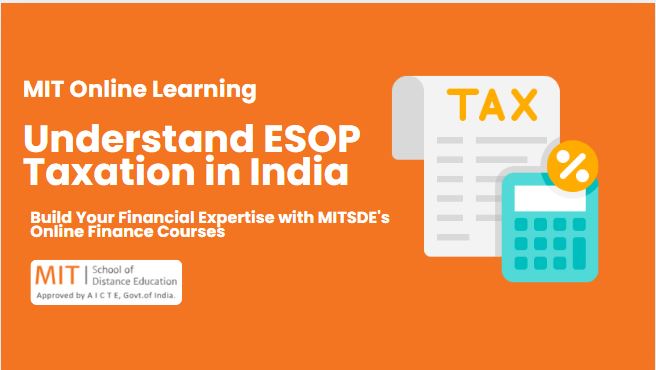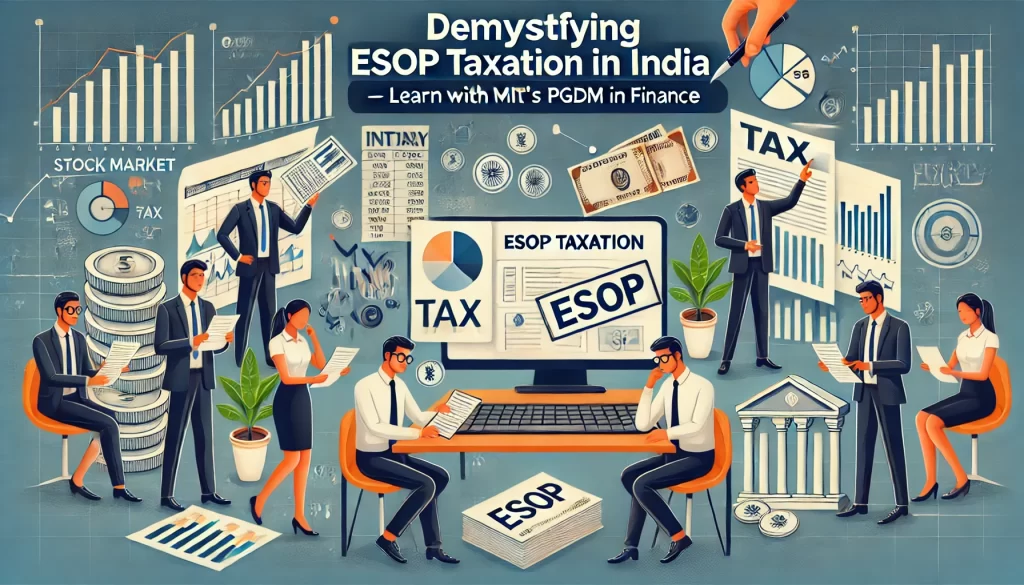
In today’s competitive job market, Employee Stock Ownership Plans (ESOPs) have emerged as a powerful tool for employee retention, motivation, and wealth creation. As companies—especially startups and tech firms—aim to reward long-term contributors, ESOPs have gained immense popularity in India. However, while ESOPs can be financially rewarding, their taxation is often complex and misunderstood.
Whether you’re a working professional, a finance enthusiast, or pursuing a PGDM in finance, understanding the intricacies of ESOP taxation in India is essential. This guide breaks it down step-by-step.
What Are ESOPs?
An Employee Stock Ownership Plan (ESOP) is a scheme that allows employees to purchase shares of the company they work for, often at a discounted rate. It provides a sense of ownership and aligns the employee’s goals with the long-term vision of the company.
Key Terms You Should Know:
- Grant Date: When the ESOP is given to an employee.
- Vesting Period: The time the employee needs to stay in the company to own the options.
- Exercise Price: The price at which the employee can buy shares.
- Exercise Date: When the employee decides to purchase the shares.
- Sale Date: When the employee sells the shares in the market.

Understanding ESOP Taxation in India
ESOPs are taxed at two stages:
1. At the Time of Exercise
When an employee chooses to buy shares at the exercise price, and if the current market value is higher, the difference between market value and exercise price is taxed as perquisite income under the head “Income from Salary”.
Example:
- Exercise Price: ₹100
- Fair Market Value (FMV): ₹300
- Taxable Perquisite: ₹300 – ₹100 = ₹200 per share
This ₹200 per share is added to your salary income and taxed according to your income tax slab rate.
2. At the Time of Sale
When the employee sells the shares, the gains are subject to Capital Gains Tax.
Short-Term Capital Gains (STCG):
- If shares are sold within 12 months of purchase (for listed companies).
- Taxed at 15% flat rate.
Long-Term Capital Gains (LTCG):
- If held for more than 12 months.
- Gains above ₹1 lakh taxed at 10% (without indexation benefit).
How to Calculate Taxes on ESOPs: A Detailed Illustration
Let’s break it down with numbers for better clarity:
- Exercise Price: ₹100
- FMV on Exercise Date: ₹300
- Sale Price After 1 Year: ₹600
1. Tax at Exercise:
- Perquisite: ₹300 – ₹100 = ₹200 (taxed as salary)
2. Capital Gain at Sale:
- Selling Price – FMV: ₹600 – ₹300 = ₹300 per share
- Since held for over 12 months, it’s LTCG.
- Tax applicable: 10% on gains exceeding ₹1 lakh.
TDS (Tax Deducted at Source) on ESOPs
Your employer may deduct TDS on the perquisite value when you exercise the ESOP. This is applicable even if the shares are not sold. This makes it crucial to plan your finances, as you might end up paying tax on gains that are not yet realized in cash.
How ESOP Taxation Applies to Startups
To encourage employee participation in startups, the Indian government offers some tax benefits:
Under Section 80-IAC:
Recognized startups can defer the tax payment on ESOPs. The tax will be due:
- Within 48 months of the exercise date, or
- When the employee leaves the company, or
- When the shares are sold—whichever comes earlier.
This helps startup employees manage tax liabilities better.
Why Finance Professionals Must Master ESOP Taxation
If you’re pursuing a finance management course or a PGDM in finance, ESOP taxation isn’t just theory—it’s real-world application. You’ll encounter clients or scenarios involving employee stock options, tax planning, and investment decisions.
Understanding ESOPs helps in:
- Personal financial planning
- Equity compensation structuring
- Tax consultancy
- Corporate finance strategies
If you’re serious about building a solid foundation in finance, you must develop a practical understanding of how taxation impacts investment instruments like ESOPs.
How to Manage ESOP Taxes Efficiently
Here are some best practices to help employees and professionals manage ESOP taxation effectively:
 1. Plan Your Exercise Strategically
1. Plan Your Exercise Strategically
Exercise your options when the FMV is lower or close to the exercise price to reduce your perquisite tax liability.
 2. Hold for Over a Year
2. Hold for Over a Year
Holding the shares for more than 12 months after exercising can shift your capital gains from STCG (15%) to LTCG (10%), potentially saving a significant amount in taxes.
 3. Diversify Your Portfolio
3. Diversify Your Portfolio
Don’t rely solely on ESOPs for wealth creation. Spread your investments across other asset classes to manage risk.
 4. Stay Updated with Tax Laws
4. Stay Updated with Tax Laws
Taxation rules for ESOPs evolve. Continuous learning through finance certificate programs and online finance courses can keep you ahead of changes.
The Role of PGDM in Finance in Understanding Taxation
If you are looking to gain expert-level understanding of finance and taxation, enrolling in a PGDM in Finance is a smart move.
The PGDM in Finance program at MIT School of Distance Education (MITSDE) is tailored to meet the needs of professionals and freshers who want to:
- Develop practical finance and tax skills
- Learn strategic financial planning
- Master financial instruments like ESOPs, mutual funds, equities
- Build a rewarding career in corporate finance, investment banking, and tax consultancy
Why Choose MITSDE for Finance Courses?
MITSDE offers some of the best online finance courses in India. Here’s what makes it stand out:
 Industry-Relevant Curriculum
Industry-Relevant Curriculum
Their PGDM in finance includes modules on taxation, investment planning, risk management, and accounting—ideal for understanding ESOPs and other modern finance tools.
 Flexibility
Flexibility
All finance courses are delivered online, making it ideal for working professionals to balance learning and job responsibilities.
 Recognized Certification
Recognized Certification
MITSDE’s finance certificate programs are AICTE-approved, adding credibility to your profile.
 Career Assistance
Career Assistance
MITSDE provides placement assistance, resume-building, and interview preparation to help you succeed in your finance career.
Career Roles After Completing PGDM in Finance
With a deep understanding of financial instruments and taxation, you can pursue roles like:
- Financial Analyst
- Equity Research Analyst
- Tax Consultant
- Portfolio Manager
- Corporate Finance Advisor
- Wealth Manager
These roles often require professionals to understand tools like ESOPs and their tax implications, making this knowledge highly valuable.
Conclusion: Knowledge Is Your Best Investment
ESOPs are more than just stock options—they’re financial instruments that, if managed wisely, can significantly boost your wealth. But taxation rules can be a double-edged sword. A lack of awareness may result in hefty taxes or compliance issues.
Whether you’re receiving ESOPs or advising someone who is, a clear understanding of how ESOP taxation works in India is essential.
Invest in your financial education through reputed finance certificate programs or consider an advanced Ex. PGDM in Finance from a trusted institute like MITSDE. It’s the best way to gain clarity, confidence, and career growth in the finance domain.
Explore MITSDE’s PGDM in Finance Today!
Don’t let tax complexities hold you back. Enroll in MITSDE’s comprehensive finance management course and transform your career. With expert faculty, cutting-edge curriculum, and flexible learning, MITSDE helps you stay ahead in the ever-evolving finance landscape.


